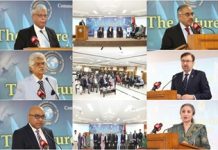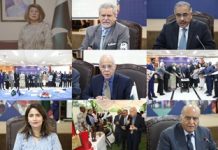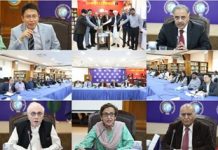Why are we sitting it out?
The region around Pakistan, extending from South Asia to West Asia and the Arab world is in a state of flux. Perhaps for the first time after the end of the Cold War a couple of decades back, the changes in most part signal a fundamental shift in alignments and power correlations involving not only the regional countries but also the United States, Europe, Russia, China and to some extent Japan.
Take the case of the 34-year-old acrimony and virtual collapse of relations between Tehran and Washington consequent to the hostage crisis after the success of the Islamic Revolution in Iran. The snow is melting between the two sides after the celebrated telephone conversation between Presidents Rouhani and Obama.
On an even more positive note, all indications are that the US has at long last come to live with the reality that Iran has to right to acquire the ways and means for peaceful application of self-generated nuclear energy. That is no mean achievement for Tehran.
That in itself is a game changer. For, Iran has over the course of the past 12 years demonstrated it to the world, through resolute determination, national will and dextrous diplomacy, any country in the world can actually acquire nuclear power – regardless of all kinds of sanctions imposed by the United Nations, the United States and the European Union.
The brave nation of Iran has of course had to pay a very high price for this defiance. Over the past year or so in particular, the common people have suffered through inflation, loss of jobs with the closure of industries and other business-related enterprises, shortages of food as also life-saving medicines.
I have a friend from Iran who is currently doing his PhD at the Quaid-i-Azam University here in Islamabad. Madi Kazemian, a journalist by profession, told me the other day that he had lost an uncle in Iran because he could not be provided treatment for cancer. The media has also been reporting a large number of deaths for the same reason of unavailability of requisite medicines.
A most heartening spill-over consequence of the thaw between Iran and the United States has been the increasing marginalization of Israel. At the same time, the US-Saudi Arabia alliance of sorts is on the verge of collapse on account of Riyadh’s dismay at improvement of relations between Iran and America.
On the other hand, the Syrian situation has not gone the US way, thanks to the tough stance taken by President Putin. It may be noted in passing that Putin has recently expressed Russia’s desire to increase bilateral ties with Pakistan and improve relations in other fields. Putin, incidentally, has come to be the world’s most influential person beating Obama in the Forbes ratings.
Yet another crucial change has been the comeback staged by the Egyptian army. That has also been seen as a setback for Saudi Arabia. Not to be overseen in this narrative is the reported offer by Iran to supply free of cost oil to India to help keep its refineries going.
The wholesome promise of improvement of Pakistan’s relations with Iran, too, seems like a closed chapter. That is very unfortunate. We have buckled under Saudi pressure and threat of repatriation of a large number of Pakistani workers from the Kingdom.
That need not and should not have been the case. Prime Minister Nawaz Sharif’s government is dithering on the foreign front. The time calls for abandoning of Pakistan’s traditionally reactive foreign policy, or else we stand to lose out on the opportunities being provided by the regional matrix. This writer had pointed out to the government quite some time back not to entertain high hopes of an early improvement of relations with India.
That is exactly what we have witnessed. Here is a quote from Salman Khurshid’s statement in Melbourne on November 11: “But the on-the-ground reality and the results of our meetings are very disappointing. Pakistan has a lot of very, very difficult issues to deal with at home. Our view is that we should give them time – not at our cost, of course, but that we should give them the benefit of the doubt.”
Is that the kind of treatment we are so keen to get at the hands of Indians? Again, the PML-N needs to pause and ponder before bringing further humiliation to the people of Pakistan that have voted this party into power.
As for Saudi Arabia, apart from the reasons given above for capitulating to its diktat, there seems to be another factor at work here as well. That has to do with the person of Prime Minister Nawaz Sharif who spent long years of exile in the Kingdom.
If he feels indebted to them for the hospitality afforded him, it is a personal matter for him. We as a nation owe no such debt to the Saudis. The nation should not be made to pay such a heavy price as estrangement with Iran yet again.
The price has become many times more when the sectarian influence and its doings are also taken into account. And, that is the innocent blood being shed day in and day out. That should be unacceptable.
Views expressed are of the author and do not necessarily reflect the views of ISS or of the Government of Pakistan.












